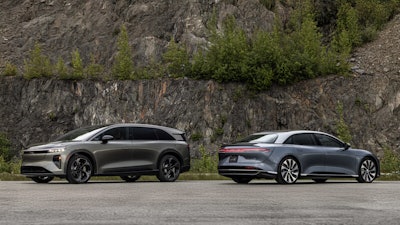
Electric vehicle maker Lucid Group today announced the Minerals for National Automotive Competitiveness Collaboration (MINAC), a new partnership with critical mineral producers Alaska Energy Metals, Graphite One, Electric Metals, and RecycLiCo, to accelerate the development of domestic critical mineral resources and the procurement of these minerals for use in automotive manufacturing by U.S.-based automakers and Tier 1 suppliers.
"Domestic supply chains strengthen manufacturing resilience, fortify sustainable supply chains, and accelerate job growth," said Marc Winterhoff, Interim CEO of Lucid. Former CEO Peter Rawlinson resigned earlier this year after the company posted a Q4 net loss of $397 million, which contributed to an annual shortfall of $2.7 billion.
MINAC will work together to:
- Advance domestic mineral production through the completion of offtake agreements for American critical minerals for use in American automobiles—an offtake agreement is a long-term contract in which a buyer agrees to purchase a significant amount of a seller's future output, often before the seller's project is even built.
- Identify and resolve barriers, while accelerating commercialization and customer adoption.
- Expand coordination between the mining and automotive sectors.
- Support the qualification and procurement of domestically produced materials by U.S.-based automakers and Tier 1 suppliers.
Alaska Energy Metals, based in Anchorage, is leading the development of a large-scale nickel project in the interior of Alaska. Nickel is a critical component of lithium-ion batteries. The use of high nickel content in battery chemistries plays a crucial role in creating high-energy-density battery cells, which can extend vehicle range, improve battery life, and reduce reliance on other metals, such as cobalt.
"By developing resilient automotive supply chains, we establish commercially viable mining operations that also help strengthen the American Defense Industrial Base," said Gregory Beischer, president and CEO of Alaska Energy Metals. "Sourcing minerals domestically enables better regulatory oversight, higher environmental standards, metal source traceability, and responsible sourcing. This approach mitigates harmful environmental and human rights risks often associated with foreign mining operations and provides an opportunity to improve the livelihoods of American communities."
Electric Metals USA Limited is currently developing the Emily manganese project in Minnesota. As a key component in lithium-ion battery cathodes, manganese enhances energy density, lowers cost, and improves thermal stability—playing a critical role in enabling long-range, high-performance electric vehicles while ensuring battery and passenger safety.
"With no current domestic production of manganese, our project addresses a critical vulnerability in the nation's supply chain," said Brian Savage, CEO of Electric Metals. "This collaboration is a strategic step toward reducing reliance on foreign sources and strengthening U.S. industrial and energy security."
Graphite One is currently developing facilities for the production of graphite in various locations across the U.S., including synthetic graphite in Ohio and natural graphite in Northern Alaska. Both of these sites are expected to begin producing graphite by 2028. Lucid and Graphite One have previously announced agreements to supply these synthetic and natural graphite materials to Lucid once production begins.
RecycLiCo is a critical minerals refining company specializing in the use of advanced hydrometallurgical technologies for processing mined ore and the upcycling of lithium-ion battery materials. RecycLiCo's processes efficiently recover battery-ready lithium, cobalt, nickel, and manganese from end-of-life batteries and manufacturing scrap, supporting both energy storage and broader industrial applications. RecycLiCo's business focus aligns with the global demand for future-ready, responsible supply chains and the growing movement to strengthen domestic sourcing of critical materials.






















